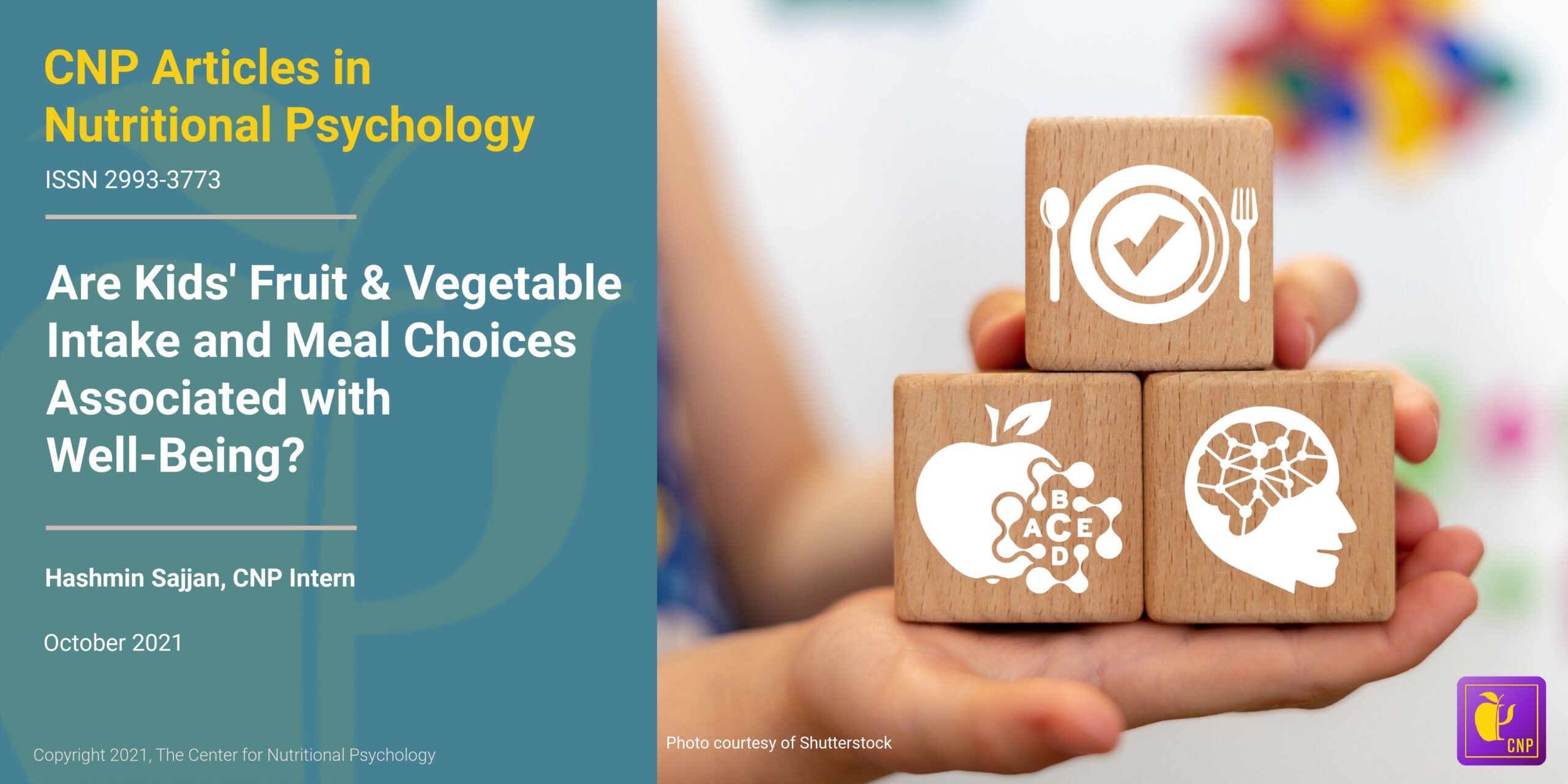Are Kids’ Fruit and Vegetable Intake and Meal Choices Associated With Well-Being?

This CNP Article was published in 2021, and much additional research on the child diet-mental health relationship has been published, supporting our increased awareness of the connection between diet and mental health. Visit the CNP Child and Adolescent Research Library in the Nutritional Psychology Research Library (NPRL) or Parent News to learn more.
Our developmental years are predictive of overall well-being and long-term health. In fact, early life well-being and affect (the outward expression of a person’s internal emotions) may be predictive of positive life outcomes a decade later (Kansky et al., 2016). Having optimal nutrition, including an abundant amount of fruits and vegetables, is advised for children to promote a healthy lifestyle. While it is common knowledge that consuming fruits, vegetables, and other nutritious foods benefits our physical health, studies are beginning to investigate the role of nutrient-dense foods and their positive impact on psychological health. Previous research has found that eating more fruits and vegetables is associated with less depression, increased happiness, better life satisfaction, and higher social-emotional wellness (Conner et al., 2017).
Studies are beginning to investigate the role of nutrient-dense foods and their positive impact on psychological health.
In a cross-sectional study, researchers explored the relationship between children’s nutrition and mental health and investigated whether nutrient-dense foods like fruit and vegetables impacted their mental health (Hahoe et al., 2021). Researchers took self-reported dietary choices from children enrolled in over 50 schools in Norfolk, UK. Two versions of the self-reported dietary choice surveys were appropriately constructed for secondary and primary school children. The survey consisted of questions that provided data for the study, including demographics, possible health conditions, nutrition, living situations, and adverse experiences (Tennant et al., 2007). Mental health was evaluated through the Warwick-Edinburgh Mental Well-being Scale (WEMWBS) for secondary school students and the Stirling Children’s Well-Being Scale (SCWS) for primary school students.
This study found a significant relationship between children’s nutrition and their mental health. Researchers found that both secondary school students and primary school students had a strong relationship between their nutritional habits and mental well-being. Mental well-being in this study is defined as being in a condition where an individual is aware of their abilities, can manage life stressors, be productive, and contribute to their community.
Students had a strong relationship between their nutritional habits and mental well-being.
Students who consumed more fruits and vegetables had significantly higher mental well-being scores. Another nutritional variable that revealed a relationship with students’ mental well-being scores was the type of breakfast consumed. Those who consumed a conventional breakfast (such as cereal, yogurt, porridge) had higher well-being scores than those who consumed snacks/breakfast bars, energy/non-energy drinks, or other, or nothing. The consumption of lunch also demonstrated a notable relationship with well-being, as students who did consume lunch had a lower well-being score than those who did not consume lunch.
Researchers’ findings revealed significant results supporting the relationship between children’s nutrition and mental health. These findings are a valuable addition to the growing body of research exploring the relationship between nutrition and children’s psychological health. Read more about the child and adolescent Diet-Mental Health Relationship in the CNP Parent Research Library.
References
Conner, T. S., Brookie, K. L., Carr, A. C., Mainvil, L. A., & Vissers, M. C. (2017). Let them eat fruit! The effect of fruit and vegetable consumption on psychological well-being in young adults: A randomized controlled trial. PloS One, 12(2), e0171206. https://doi.org/10.1371/journal.pone.0171206
Hayhoe, R., Rechel, B., Clark, A. B., Gummerson, C., Smith, S. J. L., & Welch, A. A. (2021). Cross-sectional associations of schoolchildren’s fruit and vegetable consumption, and meal choices, with their mental well-being: A cross-sectional study. BMJ Nutrition, Prevention & Health, e000205. DOI: 10.1136/bmjnph-2020-000205
Kansky, J., Allen, J. P., & Diener, E. (2016). Early adolescent affect predicts later life outcomes. Applied Psychology, 8(2), 192–212. https://doi.org/10.1111/aphw.12068
Tennant, R., Hiller, L., Fishwick, R., et al. (2007). The Warwick-Edinburgh Mental Well-being Scale (WEMWBS): Development and UK validation. Health Qual Life Outcomes 5, 63. https://doi.org/10.1186/1477-7525-5-63








Leave a comment